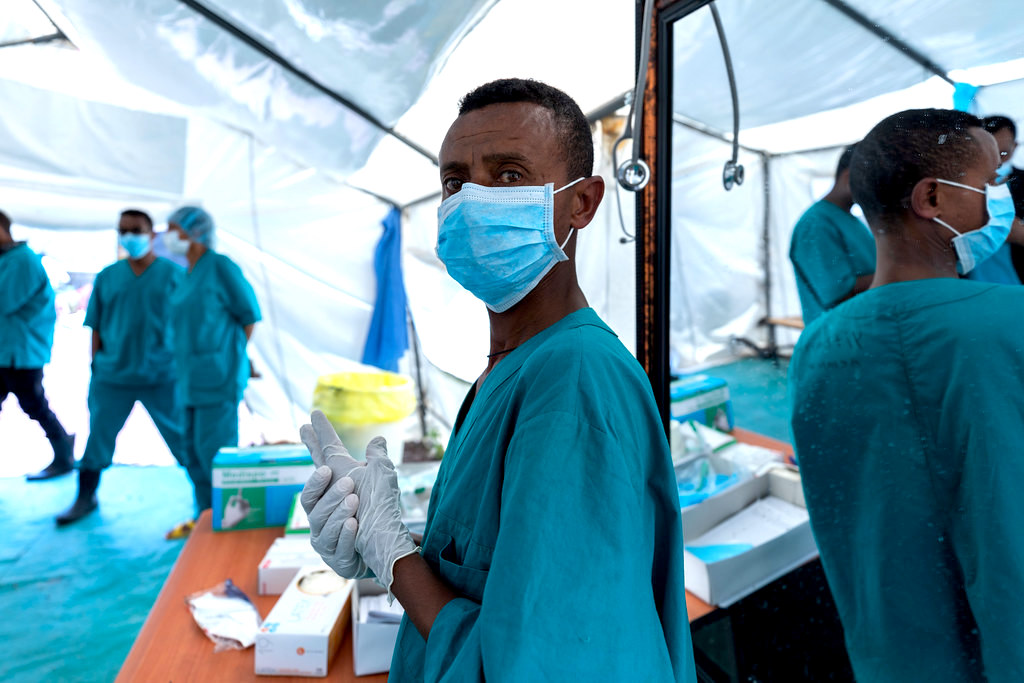Moderna, Pfizer and BioNTech rake in millions an hour while refusing to share manufacturing recipes with low-income countries.

Covid-19 isolation center at Bole-Chefe, Ethiopia, April 9, 2020. (UNICEF, Mulugeta Ayene)
Moderna, Pfizer and BioNTech — the makers of the two most successful coronavirus vaccines — are raking in a combined $65,000 in profits every minute as they refuse to share their manufacturing recipes with developing countries, where billions of people still lack access to lifesaving shots.
According to a new People’s Vaccine Alliance analysis of recent earnings reports, People’s Vaccine Alliance, “It is obscene that just a few companies are making millions of dollars in profit every single hour while just two percent of people in low-income countries have been fully vaccinated against coronavirus,” said Maaza Seyoum of the People’s Vaccine Alliance Africa.
“Pfizer, BioNTech, and Moderna have used their monopolies to prioritize the most profitable contracts with the richest governments, leaving low-income countries out in the cold.”
Moderna — a Massachusetts-based company that developed its vaccine with the help of government research and around $10 billion in taxpayer funding — has delivered just 0.2 percent of its total vaccine supply to low-income countries, the People’s Vaccine Alliance estimates. The coronavirus vaccine is Moderna’s only product on the market.
Pfizer and its Germany-based partner BioNTech — whose vaccine was also helped along by taxpayer money — haven’t done much better than their competitor, sending less than 1 percent of their supply to poor nations while profiting hugely from sales to rich countries.
“Predominantly, right now, we have already signed orders, and those are with high-income countries,” Pfizer CEO Albert Bourla recently said of coronavirus vaccine sales for next year, blaming poor countries for not ordering shots quickly enough.
“We are negotiating right now with few middle-income countries, and with even fewer low-income countries,” Bourla said.
But public health campaigners argue that bilateral deals and vaccine donations are not sufficient to bring production and distribution into line with global needs. Instead, they say, pharmaceutical giants must relinquish their vaccine recipes and allow qualified manufacturers around the world to produce low-cost generic versions for their populations.
Moderna and Pfizer-BioNTech have thus far refused to do so — and lobbied aggressively against a World Trade Organization proposal to temporarily suspend vaccine patents. Bourla, for his part, has dismissed technology-transfer proposals as “dangerous nonsense.”
“Contrary to what Pfizer’s CEO says, the real nonsense is claiming the experience and expertise to develop and manufacture lifesaving medicines and vaccines does not exist in developing countries,” Anna Marriott, health policy manager at Oxfam International, said in a statement Tuesday. “This is just a false excuse that pharmaceutical companies are hiding behind to protect their astronomical profits.”
“It is also a complete failure of government to allow these companies to maintain monopoly control and artificially constrain supply in the midst of a pandemic while so many people in the world are yet to be vaccinated,” she added.
This article is from Common Dreams.
